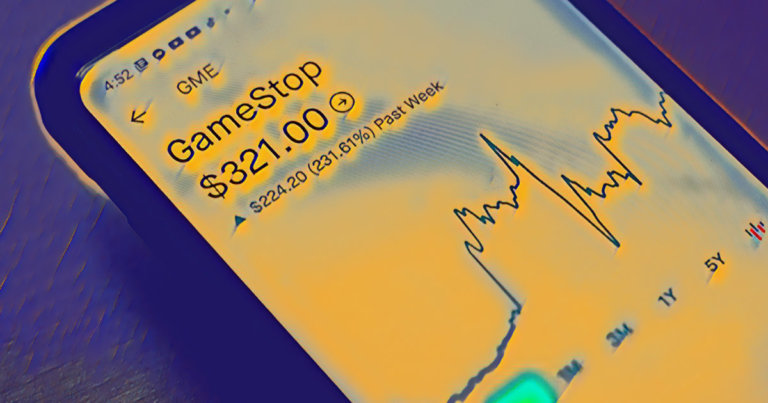 How decentralized exchange can benefit from the aftermath of the Robinhood saga
How decentralized exchange can benefit from the aftermath of the Robinhood saga How decentralized exchange can benefit from the aftermath of the Robinhood saga

Photo by Clay Banks on Unsplash
Since the apex of the GameStop saga, Robinhood has acknowledged its capital issues, raised $3.4 billion, and its co-CEO Vlad Tenev has called for the end of T+2 settlement.
As defined by Wikipedia, T+2 settlement is “a shorthand for trade date plus two days indicating when securities transactions must be settled.”
Analyzing the flaws of traditional finance presents a massive growth opportunity for DEXs like Uniswap and 0x.
Robinhood clarifies its halting of GameStop trading
On their blog, Under the Hood, Robinhood explained the cause for its “temporary restrictions” as related to clearinghouse requirements. More specifically, Robinhood says that during the week as GameStop trades grew, “[their] clearinghouse-mandated deposit requirements related to equities increased ten-fold”.
This echoes the second theory I covered in an article about Robinhood’s flaws amidst WallStreetBets’ short squeeze.
This led to a sudden venture capital raise of $3.4 billion from their existing investors led by Ribbit Capital and with a16z and Sequoia among others participating. Robinhood CFO Jason Warnick noted:
“This round of funding will help [Robinhood] scale to meet the incredible growth we’ve seen and demand for our platform. We are humbled by our customers’ response to our offering, and remain inspired by everyday people taking control of their financial futures.”
Although this raised questions about an upcoming IPO, it seems that Robinhood is forging ahead. Some believe that they might go public via a direct listing or SPAC though. However, this raise didn’t end their fight against what made them stop trading; co-CEO Vlad Tenev has been vocal about ending the traditional model of T+2 settlement.
Robinhood co-founder calls out T+2 settlement
In financial markets, settlement is the idea that a trade is complete.
For example, if a Robinhood trader was to buy a GameStop stock, the trade would be considered “settled” once the trader had received the stock and the seller had received the money used to buy the stock.
A T+2 system means that when you buy a stock, you do not necessarily own the stock until the end of the two-day period. This adds complexity and risk to the system. For Robinhood, if a buyer cannot pay for the stock in the two-day period or the seller cannot deliver the stock over the two-day period, this could cause a significant problem.
Robinhood works with a clearinghouse which in this case is the DTCC (Depository Trust and Clearing Corporation), the clearinghouse used by U.S. financial markets.
The DTCC requires Robinhood to post a deposit on their overall net buys/sells to help mitigate the risk. The amount that needs to be deposited is calculated by a moderately complex algorithm, but the overall idea is that high frequencies of trades particularly in one stock such as GameStop leads to rapidly increasing clearinghouse deposit requirements.
Robinhood and other brokerages began to have trouble paying for these deposits as these trades continued and thus had to halt the trades.
This is what led to Robinhood co-founder and co-CEO Vlad Tenev to call for an end to T+2 in the following thread.
It’s time for T+2 to go. (1/9)
— VLAD (@vladtenev) February 2, 2021
DeFi can offer instant settlement right now
As he says, “Technology is the answer, not the oft-cited impediment.” Decentralized exchanges like Uniswap and Sushiswap agree.
Imagine a world where investors didn’t have to worry about broker censorship and instead of archaic 2-day settlement it happened in 13 seconds.
This exists—it’s called Uniswap. ?
— Dan Romero (@dwr) January 29, 2021
They can offer real-time settlement as there is no T+2 settlement policy or middlemen involved in trades.
As a result, they have seen massive volume in recent days that are likely at least partially due to the attention they are getting from the Robinhood issues.
um so in the last 24 hours @Uniswap just did a casual $1.3B in volume and generated $4M in fees @SushiSwap did a casual $700M in volume and generated $2.1M in fees
as someone who loves markets and market structure, my mind continues to be blown ? pic.twitter.com/rmoX6D3SyF
— Meltem Demirors (@Melt_Dem) February 4, 2021
Robinhood with a reported $4.3 million daily average revenue trades is still well ahead of Uniswap. However, Uniswap only controls ~40% of the overall market. The $83B+ in total volume and 29M+ all-time trades are extremely impressive and show the decentralized exchanges have a strong opportunity to grow for the future.
The comparison between Uniswap and Robinhood isn’t entirely fair either — 55% of American adults own stock while only 14.4% of Americans own crypto as of 2019.
Robinhood allows trades of stocks and crypto while Uniswap is solely focused on crypto.
This is why the legalization of security tokens would be a huge next step for DEXs.
Today showed us that the SEC has had it wrong. The problem isn’t that some cryptos may be securities. The problem is that all securities aren’t yet cryptos.
Now is the time to draft a bill that legalizes security tokens.
— balajis.com (@balajis) January 29, 2021
Once stocks can be traded via decentralized exchange, it is likely that volume will rapidly increase. Right now, DEXs are fighting the UX of centralized exchanges and the lack of crypto adoption while security tokens would allow for the crypto adoption issue to be mitigated. It could also introduce more Americans to crypto as they trade stocks on a DEX.
The DEX market is growing and seeing volumes that are incredibly high. The decentralized infrastructure solves major challenges like instant settlement and liquidity at scale.
Although there are some concerns about issues like scalability, DEXs have the opportunity to rewrite the global financial markets.









































































































